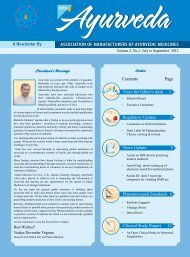Issue 12 - amam-ayurveda.org
Issue 12 - amam-ayurveda.org
Issue 12 - amam-ayurveda.org
Create successful ePaper yourself
Turn your PDF publications into a flip-book with our unique Google optimized e-Paper software.
Nandita Vijay, Bengaluru, Friday, December 30, 2011, 08:00 Hrs [IST]<br />
info Ayurveda, Volume 1, No.<strong>12</strong>, April-June’ 20<strong>12</strong><br />
European Pharmacopoeia commences<br />
development of ‘Community Monographs’ for<br />
European Pharmacopoeia and the European Medicine<br />
Agency have commenced the preparation of<br />
‘Community Monographs’ for herbal remedies. To begin<br />
with, the monographs will be made applicable for single<br />
herbs.<br />
The decision to create monographs is driven by<br />
the increasing shift in consumers opting for dietary<br />
supplements and nutraceuticals developed from herbs.<br />
The development of pharmacopoeia monographs would<br />
provide the much-needed information, stated Dr D B<br />
Anantha Narayana, leading scientist in herbal drugs and<br />
plant medicine.<br />
Even the government of India through the Indian<br />
Pharmacopoeia or Ayurveda Pharmacopoeia needs to<br />
take up this. It would be the best way to ensure India gets<br />
its prominent position in the global herbal map. In an age<br />
of growing consumption of herbal nutraceuticals, there<br />
is need for authentic information on products, its usage,<br />
quality, dosage forms and disease indications, he added.<br />
Pharmacopoeia monographs would serve not just for<br />
consumers but is important for physicians and pharmacists.<br />
US Pharmacopoeia (USP) is now primarily a regulatory<br />
quality specifications for all categories of drugs which<br />
can be extended to cover the ‘Dietary Supplements’.<br />
Although, mere presence of a herb in a Pharmacopoeia<br />
does not mean it is approved as a drug, yet its importance<br />
cannot be underestimated. Pharmacopoeia monographs<br />
provide a reference globally for quality specifications<br />
for the authentic identity, content, component quality. It<br />
is an assurance that the product sans contaminants like<br />
microbial, pesticides and heavy metals. The very mention<br />
of a herb in the pharmacopoeia monograph allows easy<br />
trade and reduces rejections in the global market. It is<br />
herbal remedies<br />
also an indication to ensure batch-to-batch consistency<br />
for researchers. While the herb with a monograph can<br />
promote future technology developments, it provides<br />
regulators a confidence on the history of usage and safety<br />
profiles in the large scale production of a product, said Dr<br />
Narayana.<br />
Globally, in the area of traditional knowledge based<br />
treatments, over 90 per cent of the products are botanical<br />
based. Despite the considerable discussions on need for<br />
standardization for herbal products, there has been a rise<br />
of use in herbal botanicals as supplements which do not<br />
come under the category of drugs. But the Pharmacopoeia<br />
experience coming handy has been largely to access the<br />
specifications of the herbs.<br />
Indian Pharmacopoeia 2010 [IP2010] has 89 monographs<br />
for herbs, processed herbs, including for extracts/oils, and<br />
herbal products. USP has over 180 monographs for herbs,<br />
powdered herbs, processed herbs including extracts, oils,<br />
and herbal products. British Pharmacopoeia (BP) has over<br />
50 monographs for herbs, powdered herbs, processed<br />
herbs including extracts, oils, and herbal products.<br />
European Pharmacopoeia (EP) has over 60 monographs<br />
for herbs, powdered herbs, processed herbs including<br />
extracts, oils, and herbal products. Pharmacopoeia of<br />
Republic of China [PRC] has over 180 monographs<br />
for herbs, powdered herbs, processed herbs including<br />
extracts, oils, and herbal products besides being the<br />
one that has quality specifications for large number of<br />
Traditional Chinese medicines (poly herbal).<br />
With international regulators insisting now insisting on<br />
authentic herbs with defined botanical identity India<br />
will need to look at building a ‘Minimum Therapeutic<br />
Guarantee’ basis and establish a natural window of few<br />
compounds and test for the compliance to the window,<br />
pointed out Dr Narayana.<br />
Courtesy: PHARMABIZ.com<br />
4


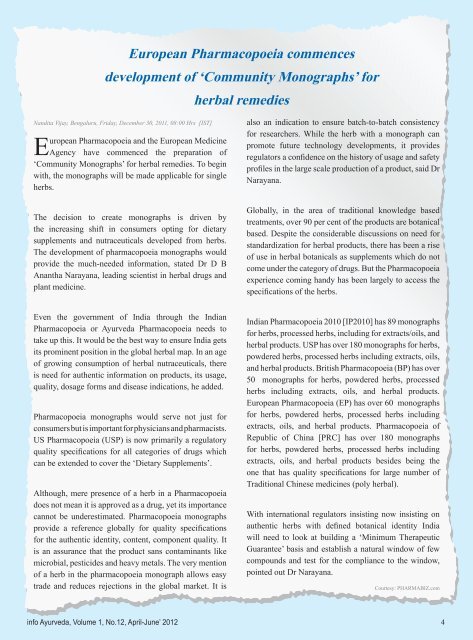

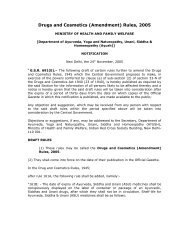
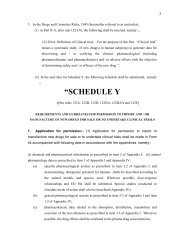
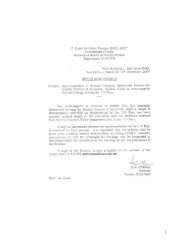
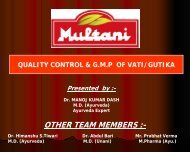
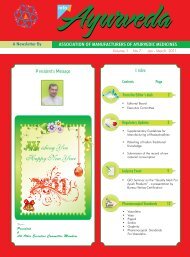
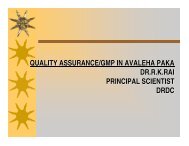
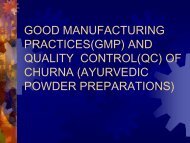
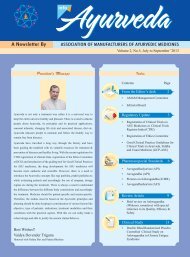
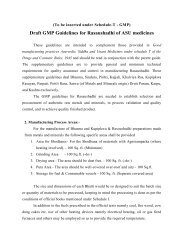
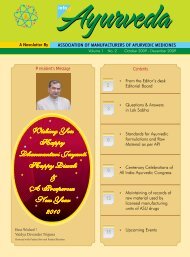
![[To be published in Gazette of India Part II Section 3, sub-section iii]](https://img.yumpu.com/28570283/1/190x245/to-be-published-in-gazette-of-india-part-ii-section-3-sub-section-iii.jpg?quality=85)

